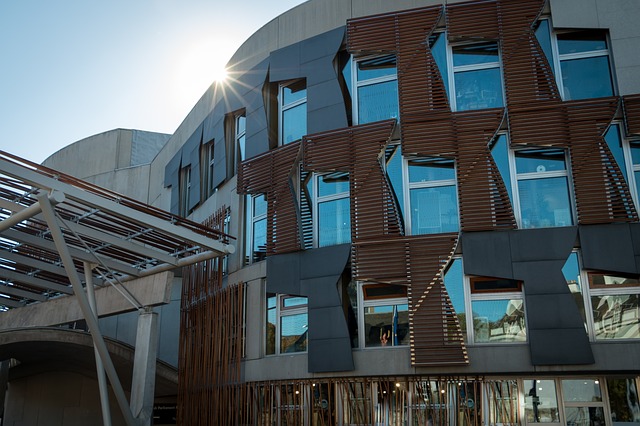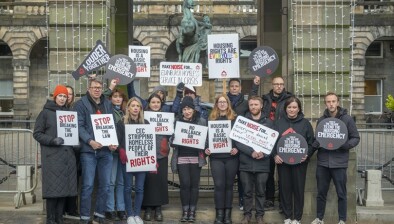Council cash reductions highlighted as Somerville sets out housing emergency response

All but one local authority in Scotland is set to receive less cash for social homes this year than they did in 2021-2022, despite the Scottish Government declaring a national housing emergency, new figures have shown.
Data from the Scottish Government reveals 31 out of 32 local authorities have been allocated less money in 2025/26 despite the Scottish Government reversing previous budget cuts to the Affordable Housing Supply Programme.
The City of Edinburgh Council was the only local authority to see an increase in its resource planning assumptions (RPA) when compared with four years ago.
The Resource Planning Assumptions are the amount of money allocated to each local authority from the Scottish Government’s Affordable Housing Supply Programme. This is used to buy and build affordable homes, with 70% of the budget earmarked for social homes provided by councils and housing associations.
Last year, the Scottish Government cut the budget by nearly £200 million, a decision that was reversed following campaigning by Shelter Scotland and other housing organisations.
Shelter Scotland has warned that while the reversal of the housing budget cuts and targeting of funding was welcome, this data shows that spending remains lower, even in cash terms, than at the start of this parliament.
It has now been a year since a national housing emergency was declared, and the housing and homelessness charity is demanding that the Scottish Government and local authorities prioritise housing.
Speaking ahead of a Ministerial statement on the government’s response to the housing emergency, Shelter Scotland director, Alison Watson, said: “It is time for Scotland’s politicians to be frank with the nation. There is no plan to end the housing emergency.
“It has been a year since a national housing emergency was declared by the Scottish Parliament, but almost all local authorities continue to have less money to spend on new social homes than they did in 2021/22.
“A Housing Bill, like the one currently going through the Scottish Parliament, that will not reduce rents, will not make it easier to build social housing and will not inject more cash into services to prevent homelessness cannot be the answer. We need radical action from our politicians.
“As 2.3 million adults in Scotland are impacted by the housing emergency, it is crucial that the Scottish Government sets out a plan as to how it will end the emergency. Ministers must work with local authorities and ensure they have the resources that they need to deliver much needed social homes.
“It is welcome that City of Edinburgh Council is getting targeted, additional funding - a recognition that the lack of social supply is felt most acutely in Edinburgh. However, given that homelessness applications in the city have risen by over 33 per cent since 2021, more urgently needs to be done.
“Reversing the budget cut should have been the start not the end of the action needed. It is time for those in government and those that aspire to government to say what they will drop to prioritise everyone in Scotland having a safe secure home. If they can’t, then they should be frank with the public and say that they believe homelessness is a price worth paying for their other priorities.
“We need a Programme for Housing. Not a Programme for Homelessness.”
‘Co-ordinated response’ to Scotland’s housing emergency
During a statement to Parliament yesterday, Shirley-Anne Somerville, the cabinet secretary for social justice, outlined the Scottish Government’s response to the country’s housing emergency. The statement reinforced housing as a cornerstone of national policy, central to eradicating child poverty, improving public health, and growing Scotland’s economy.
Ms Somerville reaffirmed that housing is both a basic right and a strategic lever for achieving broader governmental aims. “Housing is critical to supporting health, wellbeing, life chances, job prospects, and tackling child poverty,” she said. Recognising the complexity and interconnectedness of the housing crisis, the cabinet secretary said the Scottish Government has pursued a collaborative approach, working across local authorities, developers, housing organisations, and the third sector.
At the core of this response is substantial public investment: £768m this year alone to deliver 8,000 affordable homes through social and mid-market rent as well as low-cost homeownership. Complementing this is an additional £4m to prevent homelessness and £2m to bring empty privately owned homes back into use.
Ms Somerville highlighted a new £80m voids and acquisitions fund, 80% of which is allocated to five local authorities under severe housing pressure. Already, this initiative has brought over 1,000 properties back into use, halving void levels since June 2023 and alleviating pressure on temporary accommodation services.
The government is also focused on long-term investment strategies. The Housing Investment Task Force has submitted its final recommendations, and a key initiative—£100m in institutional investment—is projected to grow to £500m to build 2,800 mid-market rent homes. Further, £46m in charitable bonds has helped deliver 325 homes and generated nearly £14m in charitable contributions.
Homelessness also remains a priority, the statement continued. With 20 councils already reducing the number of children in temporary accommodation, focused interventions are showing results. Over 2,600 households with children have transitioned into permanent housing in 2024 alone. The government has committed £8m this year to support rapid rehousing and another £4m to implement new homelessness prevention duties pending parliamentary approval of the Housing Bill.
Since 2010, the Scottish Empty Homes Partnership, backed by £3.7m, has returned over 11,000 homes to active use, including nearly 1,900 in the last year.
To accelerate housing delivery, the government has tackled planning bottlenecks and focused on stalled development sites. Somerville reported that strategic intervention could unlock up to 20,000 new homes. A £15m commitment is helping enable 800 affordable net-zero homes at the Granton site, exemplifying Scotland’s place-based and climate-conscious approach.
Currently under parliamentary scrutiny, the Housing Bill promises major reforms, including new duties to prevent homelessness and the establishment of long-term rent controls in the private sector. Ms Somerville described the new prevention duties as a potential “game-changer,” designed to stop homelessness before it begins and strengthen tenant protections.
At the heart of the Scottish Government’s response is collaboration. The Housing to 2040 board, featuring developers, housing charities, COSLA, and government representatives, has helped coordinate strategy, share best practices, and test delivery plans. Nearly 90% of the recommendations from a partner coalition formed in 2023 have been implemented in full or in part.
The government has also pledged to continue its focus on rural and island housing through an extension of the Rural and Islands Housing Fund to 2028 and will double funding for housing adaptations for disabled tenants to £20m.
Despite the progress, Ms Somerville acknowledged that several external factors complicate Scotland’s housing challenges, including changes to asylum processing and the inadequacy of local housing allowance rates. She criticised the UK Government’s absence from recent discussions on refugee homelessness and reiterated the call for LHA rates to meet at least the bottom 30% of local market rents.
With a renewed commitment to delivering 110,000 affordable homes by 2032, the Scottish Government said it remains focused and determined. “We are making progress,” said Ms Somerville, “but we know that there is much more yet to do.”








